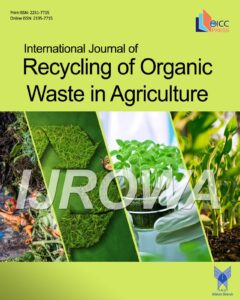Agronomic assessment of solar dried recycled olive mill sludge on Maize agrophysiological traits and soil fertility
Authors
- Bouhia Youness 1
- Karim Lyamlouli 1
- Yedir Oudouch 2, 1
- El Mehdi El Boukhari Mohamed 2, 1
-
Mohamed Hafidi
*
 2, 1
2, 1
Abstract
Purpose Olive mill waste sludge (OMWS) is a solid by-product resulting from olive oil extraction, OMWS is usually left decanting in landfills causing environmental pollution and a significant loss of recyclable organic resources. This study aims to evaluate the feasibility of producing an organic amendment through treating OMWS with solar drying (SDy), which is a low-cost method, highly adapted to semi-arid and low-income countries.
Method We investigated the effect of 90 days SDy on OMWS physico-chemical properties, then the agronomic efficiency of the resulting product was assessed under greenhouse conditions, using Zea mays as a crop model.
Results The SDy treatment significantly reduced OMWS initial moisture and the C/N ratio, while the nutrient content of the final product was improved. Pot trial under greenhouse conditions revealed that the application of SDy-OMWS improved the soil physico-chemical properties. The initial application decreased soil pH from 8.19 to 7.06, and soil phosphorus (P), potassium (K), iron (Fe) and zinc (Zn) increased by 209%, 162.4%, 290% and 270% respectively compared to the unamended control. SDy-OMWS application initially induced a delayed seed germination and plant growth at early stages, which was followed by a significant improvement of plant above and below ground traits, including photosynthetic activity, stomatal conductance, and root parameters (RL, RSA and RV).
Conclusion Overall, SDy significantly reduced the C/N ratio, moisture, and improved the nutrient content of OMWS. Despite improving soil fertility, SDy-OMWS application negatively affected the plant development at early stages. However, such effect was completely alleviated at the end of the experiment.
Highlights
- Nitrogen-fixing bacteria biologically fixes atmospheric nitrogen in natural and cropped systems.
- Organomineral fertilizers are improving crop performance, resistance and productivity.
- Azospirillum brasilense and Bradyrhizobium japonicum enhanced soybean proline activity.
- Soybean protection was improved when brasilense and B. japonicum were co-inoculated.
- Organomineral fertilizer is an efficient inoculant carrier for brasilense in soybean plants.



